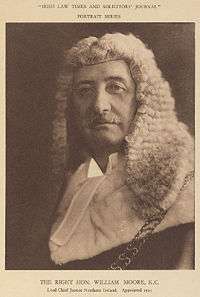Sir William Moore, 1st Baronet

Sir William Moore, 1st Baronet, PC (NI), DL (22 November 1864 – 28 November 1944) was a Unionist member of the British House of Commons from Ireland and a Judge of Ireland, then of Northern Ireland. He was created a Baronet (of Moore Lodge, Ballymoney, County Antrim, Northern Ireland) in 1932.
Biography
Sir William was the eldest son of Queen Victoria's honorary physician in Ireland, Dr. William Moore of Rosnashane, Ballymoney.[1] His ancestors came to Ulster during the Plantation, settling at Ballymoney, at which time they were Quakers. The Moore Lodge estate was inherited from a relative; the family owned several other houses: Moore's Grove and Moore's Fort. Sir William Moore's mother was Sidney Blanche Fuller. In 1888 he married Helen Wilson,[2] the daughter of a Deputy Lieutenant of County Armagh. Sir William went on to become a Deputy Lieutenant for County Antrim and a Justice of the Peace.
Sir William was schooled at Marlborough College, then attended Trinity College, Dublin,[3] where he was President of the prestigious University Philosophical Society. He was called to the Irish Bar in 1887, to the English bar in 1899, and became an Irish Queen's Counsel the same year. [4] He was a Member of Parliament, representing North Antrim 1899–1906. During this period he was an unpaid secretary to the Chief Secretary for Ireland 1903–1904.[5]
In 1903, Sir William was one of the first landowners of Ireland to sell-off their estates under the land acts. By the early 1920s he owned a Belfast pied-à-terre called 'Glassnabreedon' (Moore's public school pronunciation of 'Glas-na-Braden'), in the village of Whitehouse, 4 miles north of Belfast. This house was once owned by the son of Nicholas Grimshaw (1747–1805), Ireland's first cotton pioneer.
He became a member of the General Synod of the Church of Ireland and was a founder member of the Ulster Council.
Having lost his Parliamentary seat in the 1906 general election, Moore was elected for North Armagh at a by-election on 16 November 1906. He sat for this seat until he was appointed a judge of Ireland's High Court in 1917.[6]
He was a Justice of the Irish High Court 1917–1921.[7] He was sworn of the Privy Council of Ireland in the 1921 Birthday Honours,[8] entitling him to the style "The Right Honourable". Following the partition of Ireland, he became a Lord Justice of Appeal in the Northern Irish Court of Appeal (1921–1925). He was sworn of the Privy Council of Northern Ireland in 1922 and became the Lord Chief Justice of Northern Ireland, succeeding Sir Denis Henry – a position he held until 1937.
References
- ↑ Ball, F. Elrington The Judges in Ireland 1221–1921 John Murray London 1926 Vol.ii p.386
- ↑ Ball p.386
- ↑ Ball p.386
- ↑ Ball p.386
- ↑ Ball p. 386
- ↑ Ball p.386
- ↑ Ball p.386
- ↑ The London Gazette: (Supplement) no. 32346. p. 4529. 4 June 1921.
Further reading
- Who's Who of British Members of Parliament: Vol. II 1886–1918, edited by M. Stebton and S. Lees (The Harvester Press 1978)
| Parliament of the United Kingdom | ||
|---|---|---|
| Preceded by Hugh McCalmont |
Member of Parliament for North Antrim 1899–1906 |
Succeeded by Robert Glendinning |
| Preceded by Edward James Saunderson |
Member of Parliament for North Armagh 1906–1917 |
Succeeded by William Allen |
| Legal offices | ||
| Preceded by Denis Henry |
Lord Chief Justice of Northern Ireland 1925–1937 |
Succeeded by James Andrews |